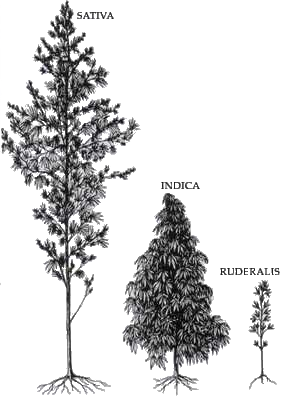Related Research Articles

Tetrahydrocannabinol (THC) is the principal psychoactive constituent of cannabis and one of at least 113 total cannabinoids identified on the plant. Although the chemical formula for THC (C21H30O2) describes multiple isomers, the term THC usually refers to the Delta-9-THC isomer with chemical name (−)-trans-Δ9-tetrahydrocannabinol. THC is a terpenoid found in cannabis and, like many pharmacologically active phytochemicals, it is assumed to be involved in the plant's evolutionary adaptation against insect predation, ultraviolet light, and environmental stress. THC was first discovered and isolated by Israeli chemist Raphael Mechoulam in Israel in 1964. It was found that, when smoked, THC is absorbed into the bloodstream and travels to the brain, attaching itself to endocannabinoid receptors located in the cerebral cortex, cerebellum, and basal ganglia. These are the parts of the brain responsible for thinking, memory, pleasure, coordination and movement.

Medical cannabis, or medical marijuana (MMJ), is cannabis and cannabinoids that are prescribed by physicians for their patients. The use of cannabis as medicine has not been rigorously tested due to production and governmental restrictions, resulting in limited clinical research to define the safety and efficacy of using cannabis to treat diseases.

Tod Hiro Mikuriya was an American medical doctor and psychiatrist. Known as an outspoken advocate for the use of cannabis for medical purposes and its legalization, he is often regarded as the grandfather of the medical cannabis movement in the United States.

Cannabidiol (CBD) is a phytocannabinoid discovered in 1940. It is one of 113 identified cannabinoids in cannabis plants, along with tetrahydrocannabinol (THC), and accounts for up to 40% of the plant's extract. As of 2019, clinical research on CBD included studies related to anxiety, cognition, movement disorders, and pain, but there is insufficient high-quality evidence that cannabidiol is effective for these conditions. Nevertheless, CBD is a herbal dietary supplement promoted with unproven claims of particular therapeutic effects.

In the United States, the removal of cannabis from Schedule I of the Controlled Substances Act is a proposed legal and administrative change in cannabis-related law at the federal level. It has been proposed repeatedly since 1972. The category is the most tightly restricted category reserved for drugs that have "no currently accepted medical use."

The Single Convention on Narcotic Drugs, 1961 is an international treaty that controls activities of specific narcotic drugs and lays down a system of regulations for their medical and scientific uses; it also establishes the International Narcotics Control Board.
The International Narcotics Control Board (INCB) is an independent treaty body, one of the four treaty-mandated bodies under international drug control law.

Cannabis, also known as marijuana among other names, is a psychoactive drug from the cannabis plant. Native to Central or South Asia, the cannabis plant has been used as a drug for both recreational and entheogenic purposes and in various traditional medicines for centuries. Tetrahydrocannabinol (THC) is the main psychoactive component of cannabis, which is one of the 483 known compounds in the plant, including at least 65 other cannabinoids, such as cannabidiol (CBD). Cannabis can be used by smoking, vaporizing, within food, or as an extract.

Cannabis tea is a cannabis-infused drink prepared by steeping various parts of the cannabis plant in hot or cold water. Cannabis tea is commonly recognized as an alternative form of preparation and consumption of the cannabis plant, more popularly known as marijuana, pot, or weed. This plant has long been recognized as an herbal medicine employed by health professionals worldwide to ease symptoms of disease, as well as a psychoactive drug used recreationally and in spiritual traditions. Though less commonly practiced than popular methods like smoking or consuming edibles, drinking cannabis tea can produce comparable physical and mental therapeutic effects. Such effects are largely attributed to the THC and CBD content of the tea, levels of which are drastically dependent on individual preparation techniques involving volume, amount of cannabis, and boiling time. Also in common with these administration forms of cannabis is the heating component performed before usage. Due to the rather uncommon nature of this particular practice of cannabis consumption in modern times as well as the legality of cannabis throughout the World, the research available on the composition of cannabis tea is limited and based broadly around what is known of cannabis as it exists botanically.

Fred Gardner is an American political organizer and author best known for his opposition to the Vietnam War and his writings about the medical marijuana movement in the United States.

Veterans for Medical Cannabis Access (VMCA), which was founded as Veterans for Medical Marijuana Access (VMMA) reflecting the pejorative word "marijuana", is an Elliston, Virginia-based non-profit service organization designed to assist American veterans who wish to be able to use marijuana for medical purposes with a doctor's recommendation. VMCA works towards the freedom for veterans to discuss the medical use of marijuana with their doctors without the risk of reprisal.

In the United States, the use of cannabis for medical purposes is legal in 38 states, four out of five permanently inhabited U.S. territories, and the District of Columbia, as of March 2023. Ten other states have more restrictive laws limiting THC content, for the purpose of allowing access to products that are rich in cannabidiol (CBD), a non-psychoactive component of cannabis. There is significant variation in medical cannabis laws from state to state, including how it is produced and distributed, how it can be consumed, and what medical conditions it can be used for.

The International Nonproprietary Name dronabinol, also known under the trade names Marinol, Syndros, Reduvo and Adversa, is a generic name for the molecule of delta-9-tetrahydrocannabinol in the pharmaceutical context. It has indications as an appetite stimulant, antiemetic, and sleep apnea reliever and is approved by the FDA as safe and effective for HIV/AIDS-induced anorexia and chemotherapy-induced nausea and vomiting only.

The Government Pharmaceutical Organization (GPO) is a Thai state enterprise which manufactures pharmaceutical products in Thailand. In 2011, the GPO netted a profit of 1.6 billion baht from the sale of pharmaceuticals and medical equipment. As of 2011, the GPO employed 2,812 persons. In 2016, the organization produced drugs at two government-owned factories.
Medical cannabis research includes any medical research on using cannabis. Different countries conduct and respond to medical cannabis research in different ways.

The following outline is provided as an overview of and topical guide to the plant Cannabis sativa and its relatives Cannabis indica and Cannabis ruderalis, the drug cannabis (drug) and the industrial product hemp.

For Alternative Approaches to Addiction, Think & do tank is an international non-profit organization working on drug policy, created in 2015 and based in Paris, France.

Michael Alan Krawitz is a US Air force veteran, Executive Director of the non-profit Veterans for Medical Cannabis Access, researcher on the history of medical cannabis, and international advocate for cannabis policy reform with FAAAT think & do tank and the International Association for Cannabinoid Medicines.
The International Association for Cannabinoid Medicines (IACM), formerly known as the International Association for Cannabis as a Medicine, is a non-profit scientific society founded in Cologne in 2000 and dedicated to the advancement of knowledge of cannabis and cannabinoid medicines among medical professionals. IACM is one of the few global non-profit medical societies or associations related to cannabis and Cannabinoids, along with the Society of Cannabis Clinicians and the International Cannabinoid Research Society.
The removal of cannabis and cannabis resin from Schedule IV of the Single Convention on narcotic drugs, 1961 is a change in international law that took place in 2021, on the basis of a scientific assessment by the World Health Organization.
References
- 1 2 3 4 5 Takakuwa, Kevin M. (May 1, 2020). "A history of the Society of Cannabis Clinicians and its contributions and impact on the US medical cannabis movement". International Journal of Drug Policy. 79: 102749. doi:10.1016/j.drugpo.2020.102749. ISSN 0955-3959. PMID 32289591. S2CID 215771647.
- ↑ "Η Δρ. Γκόλντσταϊν πιστεύει ότι η ιατρική κάνναβη μπορεί να αντικαταστήσει πολλά φάρμακα | LiFO". www.lifo.gr (in Greek). June 1, 2018. Retrieved May 26, 2021.
- ↑ Grotenhermen, Franjo; Müller-Vahl, Kirsten R. (October 23, 2020). "Two Decades of the International Association for Cannabinoid Medicines: 20 Years of Supporting Research and Activities Toward the Medicinal Use of Cannabis and Cannabinoids". Cannabis and Cannabinoid Research. 6 (2): 82–87. doi:10.1089/can.2020.0044. ISSN 2578-5125. PMC 8064956 . PMID 33912675.
- ↑ Fox, Margalit (May 29, 2007). "Tod H. Mikuriya, 73, Dies; Backed Medical Marijuana". The New York Times. ISSN 0362-4331 . Retrieved May 26, 2021.
- ↑ Mikuriya, T. (2003). Cannabis as a substitute for alcohol. O'Shaughnessy's Summer, 2003, 5–8.
- ↑ Gardner, Fred (April 8, 2007). "Army's conquer by cannabis plan". SFGATE. Retrieved May 26, 2021.
- ↑ Rosner, Abbie. "New 'Cannabis For Dementia' Podcast Launches". Forbes. Retrieved May 26, 2021.
- ↑ Hergenrather, Jeffrey (2013). "Survey of Cannabis Use for Crohn's Disease" O'Shaugnessy's Journal of Cannabis in Clinical Practice
- ↑ Gardner, Fred (2012). "SCC/O'Shaughnessy's Backstory" O'Shaugnessy's Journal of Cannabis in Clinical Practice
- ↑ "SCC Brochure (English) May 2020" (PDF). Society of Cannabis Clinicians.
- ↑ "International Chapters". Society of Cannabis Clinicians. Retrieved May 26, 2021.
- ↑ "Ensuring continuity of treatment during the COVID-19 pandemic for patients using Cannabis and cannabinoid medicines" (PDF). Office of the United Nations High Commissioner for Human Rights . April 20, 2020.
- ↑ Russo, Sarah (May 4, 2020). "Open Letter to the United Nations: Ensuring Continued Medical Cannabis Access During the COVID-19 Pandemic". Society of Cannabis Clinicians. Retrieved May 26, 2021.
- ↑ "International Association for Cannabis as Medicine". www.cannabis-med.org. May 4, 2020. Retrieved May 26, 2021.
- ↑ Bennoune, Karima (February 4, 2021). "Report of the United Nations Special Rapporteur in the field of cultural rights, on the impact of the COVID-19 pandemic on cultures and cultural rights, delivered to the Human Rights Council in its 46th session, February–March 2021". Office of the United Nations High Commissioner for Human Rights .
- ↑ "In the time of COVID-19: Civil Society Statement on COVID-19 and People who use Drugs" (PDF). International Drug Policy Consortium .
- ↑ "CND Intersessional on WHO recommendations – Vienna NGO Committee on Narcotic Drugs" . Retrieved May 26, 2021.
- ↑ Russo, Sarah (October 8, 2020). "Dr. Joel Wren's Civil Society Statement on Cannabis to the World Health Organization". Society of Cannabis Clinicians. Retrieved May 26, 2021.
- ↑ Wren, Joel (October 8, 2020). "Commission on Narcotic Drugs, Sixty-third session Second intersessional meeting, 8 October 2020, United Nations Office at Vienna Statement of Dr. Joel Wren, MBBS, Adelaide, Australia" (PDF). United Nations Office on Drugs and Crime .
- ↑ "Statement "Towards science-based scheduling of cannabis sativa and other controlled herbal medicines" [E/CN.7/2020/NGO/8] submitted by the Multidisciplinary Association for Psychedelic Studies, a non-governmental organization in consultative status with the Economic and Social Council". United Nations Documents.
- ↑ "Statement "Support patient access to medicine, vote yes!" [E/CN.7/2020/NGO/7] submitted by the European coalition for just and effective drug policies, a non-governmental organization in consultative status with the Economic and Social Council". United Nations Documents.
- ↑ "International Veterinary Cannabis Roundtable Webinar". Society of Cannabis Clinicians. Retrieved June 7, 2021.
- ↑ "Committees". Society of Cannabis Clinicians. Retrieved May 26, 2021.